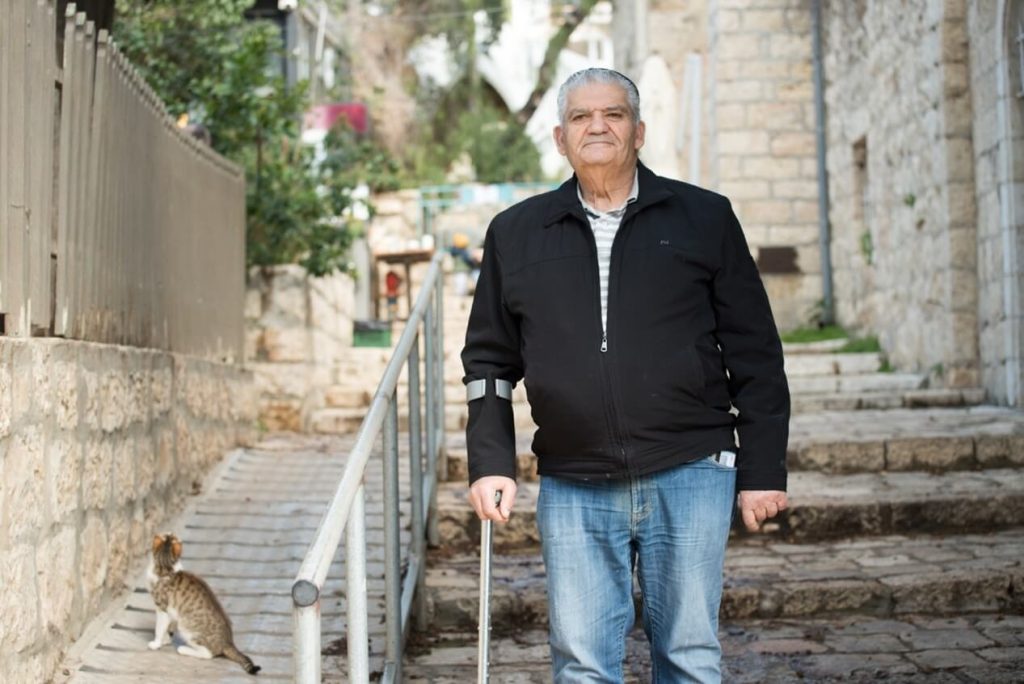
"האמן בעצמך, אם נפלת תמיד תקום ותתחיל מחדש, ותרגיש תמיד שיש לך יכולת להעניק".
"בשנת 1939 פרצה מלחמת העולם השנייה. הגרמנים הגיעו ללוב ב-1941 במטרה ליישם שם את הפתרון הסופי. כל היהודים בעלי אזרחות זרה נשלחו בחזרה לארצם, והגברים שנותרו נרדפו, נעצרו בכוח ונשלחו לבנות ביצורים, לעבודות כפייה ולמחנות ריכוז. הגרמנים גם קעקעו מספרים על ידיהם של חלק מיהודי טריפולי, שחלקם נהרגו בעינויים, מרעב או בירי מכוון.
אבי יוסף ברח והסתתר בכפרים הערביים, ואילו אימי רחל נשארה איתנו בבית. באחת ההפגזות, כשהסתתרנו בבית, הבית קרס והתמוטט עלינו. מכבי האש פינו אותנו והבריחו אותנו לכפר ערבי. החלטנו לברוח בשל החשש שכשאבי יחזור לחפש אותנו, הגרמנים יתפסו אותו.
מאחר שאיש לא הסכים להסתיר אותנו, עברנו מעיירה אחת לשנייה והסתתרנו בדיר או באורוות. התנאים היו מחפירים, ואחיי שנפצעו מקריסת הבית לא שרדו ונפטרו. באחד הימים פגע גם פגז בארווה שבה הסתתרנו ושרף אותה. אימי שהייתה חלשה מהפגיעה הקודמת, לא הצליחה לברוח משם. היא נלכדה באש, נהפכה ללפיד בוער, וכעבור כמה ימים נפטרה בייסורים.
באותם ימים לא יכלו להעביר את הנפטרים לטריפולי, אך כלה ביום חופתה יכלה להתנייד בין הכפרים, ולכן עטפו את אימי בתכריכים, הניחו הינומה על ראשה והושיבה אותה בעגלה, כשכל אותה עת אני יושב לצידה, בוכה ומתחנן שלא תעזוב אותי.
מזלי לא שפר עליי גם בחיי הבוגרים. אבי, שהיה אלים וקנאי וזלזל והתעלל בי, נשא לאישה את אחותה הצעירה של אימי, וחיי נעו בין ייאוש לתקווה. באפריל 1949, ללא התראה מוקדמת, הגיע נציג מהג'וינט ובפיו בשורה – כל מי שרוצה לעלות לישראל יכול לעשות זאת מייד. ללא היסוס החלטנו לעזוב מייד, לקחנו רק חפצים יקרי ערך ויצאנו למסע ארוך ומטלטל. גם ההתאקלמות בארץ, בשנים הראשונות, לא הייתה קלה.
לימים התמנתי למנהל עבודה בכיר בסולל בונה, זכיתי להכרה מראש העיר ירושלים, טדי קולק, וביצעתי עבודות שיש ואבן בפרויקטים ידועים ומוכרים. התחתנתי עם ג'קלין, ונולדו לנו 4 ילדים, והיום יש לנו 15 נכדים ו-4 נינים. בעיניי, הדבר החשוב ביותר אינו הרכוש או הכסף, כי אם משפחה שאוהבת ותומכת, לא רק ברגעי השמחה, אלא גם בימים הקשים."
Benny Harel – born 1936 in Tripoli in Libya
“Believe in yourself; if you fall, always get up and start again, and always feel that you have the ability to give.”
“The Second World War broke out in 1939. The Germans reached Libya in 1941, with the aim of implementing the Final Solution. All Jews with foreign nationality were sent back to their countries, and the men who remained were persecuted, arrested and forcibly sent to build fortifications, for forced labor, and to concentration camps. The Germans tattooed numbers on the arms of some of Tripoli’s Jews, some died of torture, starvation or by shooting.
My father Josef fled and hid in Arab villages, while my mother Rachel stayed with us at home. In one of the bombing attacks, as we hid at home, the house collapsed over us. The fire brigade rescued us and took us to an Arab village. We decided to flee because we were afraid that when my father came back to look for us, the Germans would capture him.
Since nobody would agree to hide us, we moved from one village to the next, hiding in cowsheds and stables. The conditions were terrible, and my brothers, who were injured when the house collapse, died. One day a shell hit the stable where we were hiding and burned it. My mother was already weak from the previous attack and was unable to flee. She was trapped in the fire like a flaming torch and died in agony a few days later.
In those days they couldn’t send the dead to Tripoli, but a bride on her wedding day could move between villages, so they wrapped my mother in shrouds, put a veil on her head and seated her on a cart, and all that time I sat next to her, crying and begging her not to leave me.
I had no luck either as an adult. My father was violent and jealous and abused me. He married my mother’s younger sister, and my life teetered between despair and hope. In April 1949, with no warning, a representative of the Joint arrived, and told us that anyone who wished to immigrate to Israel could do so immediately. Without hesitation we decided to leave, we took only our valuables and left for a long, difficult journey. Adjusting to life in Israel was also not easy in the early years.
Eventually I got a job as a senior works manager in Solel Boneh and was honored by the Mayor of Jerusalem Teddy Kollek. I was responsible for the marble and stone work on many well known projects. I married Jacqueline and we had 4 children. Today we have 15 grandchildren and 4 great-grandchildren. The most important thing is not property or money, but a loving and supportive family, not only in moments of joy but also in the dark days.”